- 当前位置:
- 首页>
- 活动>
- ������������
������������
CCG持续关注国际关系议题,推动中国与全球化的发展,积极开展国际交流,充分发挥智库“二轨外交”作用,在巴黎和平论坛、达沃斯世界经济论坛、慕尼黑安全会议等重要国际政策与意见交流平台上组织分论坛、边会、圆桌会议、晚宴等活动,促进国际政商学界对话,凝聚共识;CCG积极与各国政界、智库界、工商界开展“二轨外交”活动,每年常态化赴多国调研与交流,促进中外关系攸关方互动,保持与多国政策圈层的沟通渠道。
-
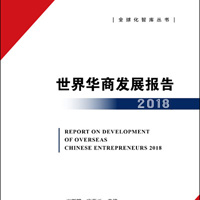
【人民日报】 | “华商在非洲”研讨会在京举行
本报北京9月4日电 (记者张 红)4日,正值中非合作论坛北京峰会举行之际,全球化智库(CCG)在北京总部举办“华商在非洲”研讨会暨《世界华商发展报告2018》新书发布会。华商融入并深刻影响着世界经济,非洲华商为中非关系发展作出了重大贡献。CCG新书发布会专门邀请中国非洲研究专家和企业家代表就“华商在非洲”议题展开研讨。 《世界华商发展报告2018》指出,2016年末,中国企业在非洲设立的境外企业有3254家,占设立的所有境外企业数的8.8%,主要分布在赞比亚、尼日利亚、埃塞俄比亚、南非、坦桑尼亚、肯尼亚、加纳、安哥拉、乌干达等国。2016年末,中国企业对非洲投资金额合计398.77亿美元。 报告指出,据调查和测算,目前在非洲的华人近200万,增长迅速,从1996年的13.6万人发展到现在的规模,未来将有更大的增长潜力。新世纪以来,非洲经济增长明显加速。据国际货币基金组织数据,2017年非洲经济总量2.19万亿美元,增长3.7%;非洲人口12.5亿,年轻人占了60%以上,有近4亿人口进入中产阶级;同时,非洲城镇化发展提速。这些都为中非合作提供了广阔空间。 《世界华商发展报告2018》是系统研究世界范围内华商及其企业经营发展的报告,由社会科学文献出版社出版发行,全球化智库理事长王辉耀和CCG世界华商研究所所长、社科院原世界华商研究中心主任康荣平主编。全书对华商整体进行了系统研究,并对不同华商群体和典型华商进行了专门分析。文章选自《人民日报海外版》,2018年9月6日
2018年9月10日 -
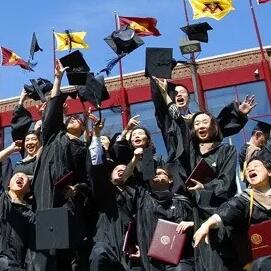
【Bloomberg】Why a Chinese Billionaire Was Studying in the U.S. Before Arrest
With a $7.3 billion fortune and business operations spanning the globe, Richard Liu could have spent the last days of August anywhere in the world. The JD.com Inc. founder chose to spend his time taking classes in Minneapolis as a student at the University of Minnesota.Why was one of China’s most successful and recognizable business figures hitting the books at all, much less so far from home in the Gopher State? That is part of the mystery surrounding Liu’s days in Minnesota, where he was arrested for alleged rape as the long Labor Day weekend got underway.Liu, 45, is a student in the university’s Carlson School of Management and was in Minneapolis to complete the American residency of a U.S.-China business administration doctorate program. Co-led by Tsinghua University -- the alma mater of Chinese leaders including Xi Jinping -- the course takes place mainly in Beijing with a singular cohort of students: the average age is 50, and many are captains of industry. The American university’s graduates include the executive manager of storied spirits-maker Kweichow Moutai and the head of fintech titan Ant Financial.The Twin Cities program is one of scores that cater to a fast-rising Chinese demographic: senior executives. Unlike in the U.S., where luminaries such as Mark Zuckerberg and Bill Gates wear their college-dropout badges with pride, Chinese executives seek academic plaudits long after they cease to matter for their careers.“If you have a better degree and better education you get more recognition,” said Wang Huiyao, founder of the Center for China and Globalization(CCG), a think-tank that advises the government. “China pays more attention to education.”JD.com’s U.S.-traded shares fell 6 percent in New York Tuesday and have dropped 29 percent this year.It’s not just about academic credentials. Many executives who grew up frustrated by overseas restrictions are indulging in travel freedoms. Others whose companies are exploring overseas markets hope to tap networks abroad and gain insight into their targets.“For people like Richard Liu, it is not so much about knowing more people. It is surely for the purpose of widening his perspective, to learn new ideas, to get better understanding of the American society and market,” said Freeman Shen, an alumnus and Carlson board of overseers member who founded electric-vehicle startup WM Motor Technology Co.Sri Zaheer, dean of the Carlson School of Management, said Liu’s course typically takes four years to complete. About halfway through, each cohort heads West for a summer residency in Minnesota where they work on applied dissertation ideas with mentors and meet the top executives of notable local companies. On the most recent visit, the faculty conducted classes on marketing and “developing critical thinking in a global context,” Zaheer said.“They’re at a stage where they feel like they’ve maybe become successful before they’ve had a chance to actually think about why or how,” she said of the executives in the program. “They seem to want to reflect on their career. They’re also interested in taking their companies to become more global. And these are the kinds of things they feel like they haven’t quite gotten a handle on.”But it’s not all work for the high-powered cohorts when they visit Minneapolis. An important part of the course involves giving Chinese executives a taste of America.“They get taken to football games and they get taken to the Minneapolis Institute of Art, so we want them to expose them a little bit to what the USA is as well,” she said.Liu was arrested by the Minneapolis police on suspicion of rape late Friday night and held about 16 hours. A Police Department spokesman says the investigation is ongoing. Joseph Friedberg, Liu’s attorney, said he is confident there will be no criminal charges and that the CEO did nothing wrong.“He’s not going to get charged with a crime,” Friedberg said Tuesday. “I would bet my license on it.”Liu is now back at work in his home country, a big source of scholars for American colleges. Though U.S.-China tensions are running high, the University of Minnesota continues to tout its decades-old tradition of welcoming students from Asia. The college says it was among the first to resume exchanges after the normalization of relations with China in the late 1970s, establishing an office dedicated to maintaining ties in 1979. In 2008, it opened an office in Beijing to support that collaboration.The “education at Minnesota is as rigorous as that in Harvard,” added Shen, who also attended the Ivy League college.Foreign graduates and recruitment executives say one deep-seated reason for the recent surge in popularity of overseas academic programs is an urgent need to solve the problems facing a rapidly changing economy: the rich-poor divide, technology development and sustainable growth among them.“What worked before, everybody knows will not work in the future,” said Ken Qi, a recruitment executive for Spencer Stuart. “The whole economy is under huge pressure to be transformed.”Such programs -- offered by countless global universities -- are increasingly popular among the executives Qi helps place in top-flight companies. The students run the gamut from internet startup founders to directors at state-owned enterprises, he said. Lower down the corporate ladder, a key attraction is the ability to network: much of China runs on connections.But the overarching driver may be a hunger to learn how to coax their Chinese companies into a new economic era. The country’s businesses -- especially those in tech -- are increasingly sending their most promising graduates in unprecedented volumes for further study to learn how Western businesses use technology to deal with economic upheaval.Spearheaded by seasoned academic, table-tennis enthusiast and Chinese citizen Tony Haitao Cui, the Minneapolis doctorate program only produced its inaugural class of graduates in May of this year. A news report posted by Kweichow Moutai showed its executive manager Cai Fangxin getting his certificate from Zaheer, the Carlson School’s dean. Other graduates onstage that day included Chen Jianhua, chairman of Hengli Group Co. and Wu Xiaoli, deputy-director of information for Phoenix Media Investment. All are considered business elite.“Carlson is known to transform students,” Ant Financial Chairman Eric Jing, a Carlson grad, said in a commencement speech to the class of 2017. “I discovered a lot here. A wealth of knowledge, a global perspective and a desire to build more bridges between Carlson and China.”The trend of Chinese executives going abroad has only just begun, said Center for China and Globalization’s Wang.“It’s going to increase because there are more business people who want to go study, there are more new problems, new challenges that need to be learned about,” he said. “The market economy was not started here that long ago so it’s quite natural for them to go to different B schools and have further studies.”From Bloomberg,2018-9-4
2018年9月10日 -
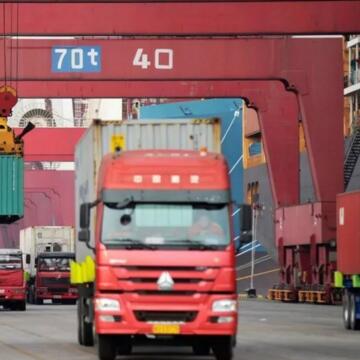
【Bloomberg】As Trump Weighs Tariffs, China’s Industrial Ambitions Loom Large
Conflict over China’s industrial policies is at the center of a trade war that’s set to escalate should President Donald Trump go ahead with planned tariffs on another $200 billion of Chinese goods as soon as this week.The core of those industrial policies is the Made in China 2025 plan to dominate industries from robotics to new-energy vehicles and aerospace. A key element of that blueprint is an unofficial document that’s slipped largely under the radar: The Made in China 2025 Major Technical Roadmap, better known as the Green Book after the color of its original cover.Whereas the official Made in China 2025 plan has no specific targets for Chinese companies to seize domestic and global market share and even says implementation must be dominated by markets, the Green Book’s 296 pages are full of goals. They are jaw-dropping targets, too, that if met would virtually lock foreign companies out of many industrial segments in China and threaten market disruption for businesses across the globe.China says the targets are non-binding and unofficial. It is committed to ensuring that the official Made in China 2025 plan and other relevant policies are applied equally to both local and foreign companies in China, Minister for Industry and Information Technology Miao Wei wrote in an April article in the state-run China Daily newspaper. The ministry didn’t respond to faxed questions seeking comments on the Green Book.But foreign lobby groups and some trade experts see the Green Book as cover for industrial targets to keep them out of official documents, where they would attract greater scrutiny from foreign governments and possibly the World Trade Organization.‘Plausible Deniability’“High-level guidance directs industrial policies in China and then lower levels of government follow with implementation plans,” says Jeremie Waterman, president of the China Center at the U.S. Chamber of Commerce in Washington. “The approach is to ensure plausible deniability, in part. In many industries now there’s a sense that a certain percentage of procurement is reserved for the domestic champions.”The Green Book was first published in October 2015 by the National Manufacturing Strategy Advisory Committee and updated most recently in January without its green cover. It had input from 25 academics and over 400 specialists and high-ranking industry representatives, according to its introduction section. The book is downloadable for free from the Internet and hard copies are sold online for about 73 yuan ($11) after discount.Strengthening manufacturing is an “important strategy” in promoting China’s national power and security, and the establishment of the advisory committee is an institutional arrangement to improve policy-making, said former Vice Premier Ma Kai at the committee’s first meeting in Beijing in August 2015.Share TargetsThe Green Book breaks down targets for dozens of industries that supply the 10 key sectors prioritized by Made in China 2025, which also include biotechnology, advanced rail equipment, and agricultural machinery. It sees Chinese companies taking a 56 percent share of the global market and 80 percent of the domestic market for integrated circuits by 2030. By 2025, they’re seen controlling 90 percent of the domestic market for new-energy vehicles including hybrid and pure electric cars, domestic mobile communication equipment, key parts of industrial robots, new energy, renewable energy equipment and energy storage equipment.In part because of the targets, foreign companies in industries including medical devices and advanced agricultural equipment -- both priority industries in the Made in China 2025 plan -- may already be losing business, says the U.S.-China Business Council.“The Chinese government may say they are guiding documents, but what we’re seeing is that those targets are being met on the ground,” said Jacob Parker, vice president for operations at the U.S.-China Business Council in Beijing. “We’re seeing increased reports of foreign companies being excluded from certain Chinese domestic government procurement processes or tenders.”Overcapacity RiskThe risk is a new round of overcapacity. That could repeat on a magnified scale the history of industries from steel to solar power and wind power that previously were swamped by Chinese competitors backed by government subsidies and cheap funding from state banks.“The chances of creating massive waste across the system are just monumental,” said Scott Kennedy, a U.S.-China expert at the Center for Strategic and International Studies in Washington. “The Chinese may just not care about that waste and believe that increased market share and dominance of the industries will eventually allow them to recoup the profits.”China is not alone in supporting its industries. Industrial policy was central to Japan’s rapid growth in the 1970s and 1980s and the Made in China 2025 plan itself draws heavily from Germany’s "Industry 4.0 Plan" adopted in 2013. In the U.S., breakthroughs in semiconductors, nuclear power, imaging technology and others were all aided by industrial policy, said Stephen Roach, former chairman of Morgan Stanley Asia.Chinese officials in Beijing have downplayed the importance of Made in China 2025 in recent meetings with foreign visitors.“The U.S. shouldn’t take Made in 2025 seriously," said Wang Huiyao, an adviser to China’s cabinet and founder of the Center for China and Globalization(CCG), whose advisory council is stacked with former lawmakers. He Weiwen, a former commerce ministry official and a fellow at the same research group, said China’s biggest concern with the U.S. is its right to develop, and it may not catch up with American manufacturing capability until 2045.Trump nevertheless appears determined to confront China on industrial policies. China, meantime, has shown no willingness to compromise on plans to upgrade its economy, creating an impasse that appears destined to deepen in the days ahead.From Bloomberg,2018-9-5
2018年9月10日 -
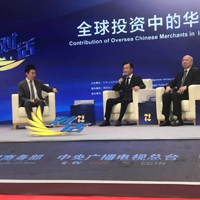
【经济网】2018国际投资论坛·华商中国梦9月7日在厦门举行
中国经济周刊-经济网讯 (记者 张燕) 9月7日,中央广播电视总台和国务院侨务办公室共同主办的论坛华商中国梦在厦门国际会议中心举办,本场论坛属于2018国际投资论坛的分论坛,世茂集团董事长许荣茂、香港大庆集团有限公司董事长陈成秀、完美(中国)有限公司董事长古润金、全球化智库(CCG)理事长 国务院参事王辉耀、厦门大学原南洋研究院院长庄国土、南非闽南总商会常务副会长王梅霜等嘉宾出席了本场论坛。论坛通过三个部分,华商的中国情结、华商从引进来到走出去、华商的中国梦具体探讨华商在中国经济中不可或缺的作用,尤其是华商在“一带一路”建设中的作用不可忽视。 近年来,有很多优秀侨商带着人才 资金 管理 技术回国发展,参加本场论坛的三位嘉宾世茂集团董事长许荣茂、香港大庆集团有限公司董事长陈成秀、完美(中国)有限公司董事长古润金是华商的优秀代表,论坛一开始通过让三位嘉宾回忆“初到中国最难忘的投资瞬间”,将时间线拉回到他们各自回国做事情的初心。古润金是1959年生于马来西亚的第三代华裔,1993年回内地投资日化产业。因为回到中国住高档酒店发现没有沐浴露,只有肥皂,所以决定做日化;而许荣茂是1950年福建出生,70年代赴香港做金融,80年代末期回内地投资商业地产,他回国的初心是因为当初观察到中国人民穿灰色的粗布麻衣和穿西服的对比所以投资了服装,而后转向商业地产;陈成秀是1948年出生于新加坡的华裔,1972年移居香港,80年代末期回内地投资运输,专注于铝箔业,是亚洲铝箔大王。他是第一个做高端铝箔材料的人,因为看到当时中国的铝箔业高端的市场被外国垄断,中国没有而决定帮助中国发展铝箔业。 据相关数据统计,目前在海外的华侨华人数量达到了6000多万人,这与意大利、英国、法国等欧洲发达国家全国的人口数量相当。而改革开放40年以来,作为我国引进外资的主体,华商投资约占我国实际利用外资总额的60%以上,华商群体对于中国改革开放40年的经济发展起到了至关重要的作用。而随着我国政府加大人才扶持力度,积极主动吸引国际人才,华侨华人的回流态势更是愈加明显。 回顾改革开放40年过程,有大批海外侨商曾突破万难,带着资金、人才、技术融入祖国改革开放大业,在投资中国经济、推动中国产业走向海外等方面做出了重要贡献,成为改革开放建设中的一支特殊力量。 2018年,在改革开放40周年、新时代号角吹响之际,华商会如何把握时代机遇?如何深度参与“一带一路”及进一步深化改革开放的建设?如何让“中国制造”、“中国建造”、“中国服务”融入 “一带一路”寻常百姓家?如何帮助更多中国企业实现全球化到本土化转变?更多内容敬请关注9月16日21:45《对话》#华商中国梦#!文章选自经济网,2018年9月7日
2018年9月10日 -
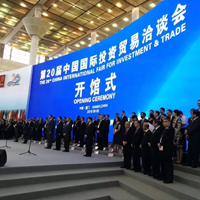
【人民网】2018海外华商中国投资峰会携手海外华商共谋发展
人民网厦门9月7日电(记者 钟自炜)“2018海外华商中国投资峰会”(简称“2018海华会”)作为“第二十届中国国际投资贸易洽谈会”国际投资论坛重要活动之一,于9月7日下午14:30在厦门国际会议中心1G白鹭厅隆重举行。大会由国务院侨办主办,福建省侨办、厦门市外侨办具体承办,中国国际投资贸易洽谈会作为支持单位,共同合作举办。共有来自26个国家和地区的近400位海外华商出席海华会。 2018海华会以“侨商与改革开放40周年回顾与展望——圆梦中国‘心’力量”为主题,聚焦中国改革开放40周年,邀请海外华商杰出代表讲述如何把握机遇,迎难而上,艰苦奋斗,在中国改革开放的浪潮中开拓前行,以及在中国进一步深化改革开放和“一带一路”建设中如何发挥作用,做出新的贡献。 中央统战部副部长、国侨办主任许又声出席大会并致辞。大会邀请到世茂集团董事局主席许荣茂,完美集团董事长古润金,全球化智库理事长王辉耀,香港大庆集团董事长陈成秀,融侨集团总裁林宏修,厦门大学特聘教授、中国东南亚学会会长庄国土等作为访谈嘉宾参与对话访谈。文章选自人民网,2018年9月7日
2018年9月10日 -
全国归侨侨眷先进个人王辉耀的先进事迹
一、创办国际化社会智库,成功推动多项国家人才政策的出台王辉耀于2008年在北京创办全球化智库(CCG),秉承“以全球视野为中国建言,以中国智慧为全球献策”的理念,坚持“从北京走向世界,搭建中外智慧交流的平台”,积极践行智库职责,通过著书立说、参与政府课题、担任政府顾问等方式,为北京经济社会发展建言献策。他曾担任北京市市长顾问,带领CCG参与市委组织部、科委、侨办等课题,承担朝阳、顺义、中关村多个区的国际人才政策课题,对推动中关村二十条等政策出台发挥了重要作用。王辉耀每年向国家部委、北京市等政府部门提交建言献策百余篇,多项研究成果获得党和国家领导人批示,成功推动多项国家人才政策的出台,为中国建立具有国际竞争力的人才制度体系做出了突出贡献。由于出色的建言献策成果,王辉耀作为智库界代表被李克强总理聘任为国务院参事。二、搭建大众与政府沟通的桥梁,凝聚社会共识,推动中国全球化发展CCG每年举办百余场活动,这些活动大多在北京开展,以大型论坛、高端研讨会等邀请国内外政商学界知名人士集聚首都,献策北京。目前已形成了“中国与全球化圆桌论坛”、“中国人才50人论坛”等多个智库活动品牌,研判中国在全球化中的新挑战,探索中国的全球化战略,为北京乃至中国融入世界人才战略,建立具有国际竞争力的人才制度优势献计献策。王辉耀带领CCG以北京为舞台,成功搭建起大众与政府沟通的桥梁,合理引导社会舆论,积极推动全球化理念在中国的传播,为凝聚社会共识,为中国参与及推动全球化发展起到重要作用。三、推动中国的留学海归事业大发展作为一名回国二十多年的归侨,王辉耀积极投身留学归国人员融入祖国的事业,凝聚国际高端人才,为祖国发展建言献策。他曾是中国侨联华商会副会长和北京市华商会创始会长,带领创办欧美同学会商会,并被推选为创始会长,参与创建了中国欧美同学会办会的新模式,组织创办了高端海归的精英组织“2005委员会”,担任首届创始理事长。他担任了欧美同学会副会长和欧美同学会总会建言献策委员会主任,为欧美同学会和中国海归群体做了大量工作,为中国发展大环境提供了一个融汇各国智慧、提供政策建言、联络国际交流、深化中外合作的平台,为中国的留学和海归事业大发展做出了重要贡献。 四、践行民间外交使者身份,为中国参与全球治理做出重要贡献随着全球化的加快,“二轨外交”对于各国关系的影响已不容小觑。王辉耀带领CCG率先“走出去”,在华盛顿、纽约、法兰克福、伦敦、巴黎等设立海外代表,并成立香港委员会。通过在海外举办高规格国际研讨会,积极发挥中国新型智库的国际影响力,很好的践行着民间外交使者身份。在特朗普访华之前,王辉耀带领CCG团队深入华盛顿、纽约等美国政商中心,就中美关系的核心问题与美国主流智库及国会山两大党派的参众议员代表等举办12场深入交流。并在特朗普访华前一周,发布《CCG赴美调研报告:寻求稳定、均衡和共赢的中美关系》,为探索构建共赢合作的中美关系积极努力。作为国际移民组织(IOM)国际顾问董事会理事中唯一一位中国董事, 王辉耀不断为世界的移民和经贸发展提供中国经验和智慧,并成功推动中国加入IOM,为中国积极参与全球治理做出重要贡献。王辉耀创办的CCG被授予中央人才工作协调小组授牌的人才理论研究基地、中联部“一带一路”智库联盟理事单位、被国家人社部授予博士后科研工作站资质。在美国宾夕法尼亚大学《全球智库报告2017》中,CCG位列全球顶级智库百强榜91位,成为首个进入世界百强的中国社会智库,并在全球最佳社会智库榜单中位列中国社会智库第一。2017年,CCG获得中国管理科学学会“2016- 2017年度十大中国管理价值组织”奖,成为唯一获此殊荣的社会组织,王辉耀被评为“2016 - 2017年度十大中国管理价值年度人物”。文章选自北京侨联,2018年9月5日
2018年9月10日 -
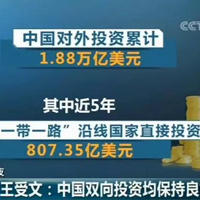
【央视财经评论】丨投洽会20载,”引进来”、”走出去”如何释放经济新活力?
第二十届中国国际投资贸易洽谈会9月8日在福建省厦门市开幕。商务部副部长王受文在致辞中表示,投洽会已成为全球规模最大、功能最完善、影响力最广的国际性投资促进平台和全球性双向投资盛会,架起了中国与世界各国加强合作、共谋发展的桥梁,也成为中国改革开放的重要窗口。本届投洽会在展区规划上融入“一带一路”发展倡议,关注新经济和新热点,并且设置了投资中国、国际投资、现代服务业投资、人才项目、大健康产业、跨境电商、新兴产业、商业自媒体和版权投资等16个专业展区6000个展位。中国双向投资的发展,不仅促进了中国经济的持续增长,也对世界经济增长发挥了积极作用。境外产品、服务、技术、资本在巨大的中国市场寻找到了共赢之路,中国制造、中国建设、中国资本也不断给国际市场带来新的活力。今年投洽会有哪些新亮点和新变化?未来会有什么新机遇?9月8日晚,全球化智库理事长、国务院参事王辉耀和对外经济贸易大学副校长赵忠秀做客财经频道演播室,深度解析。投洽会满20届 释放经济新活力 王辉耀:投洽会助推中国经济融入全球化全球化智库理事长、国务院参事 王辉耀:今年投洽会规模比以往更大,呈现出更开放的氛围,参与的企业也更多了,最早从厦门开始扩展到福建,现在是从东南亚通向全世界,来自于世界各地的投资企业来参加这个盛会,这是面向世界的投资平台,释放出更开放的信号,欢迎广大投资者来中国,中国仍然是投资的热土。 赵忠秀:投洽会20年 从地方到全国到全球对外经济贸易大学副校长 赵忠秀:过去20多年,从区域的引资平台变成了全国投资促进平台,现在又变成了全球的投资促进平台,伴随着经济一体化的进程,从区域走向全国,现在走向了世界。今年有将近10万客商来参加投洽会,影响力之大、范围之广以及在投洽会上能够一起研讨全球投资的趋势,投洽会发挥的作用非常大。 引进投资 开放的大门 越开越大新闻链接:数据显示,截至今年7月底,中国累计吸收外资约2.09万亿美元,外资为中国贡献了1/10的城镇就业,中国对外投资累计达1.88万亿美元,其中,近5年,中国对“一带一路”相关国家直接投资累计达807.35亿美元。王辉耀:中国更高层次开放欢迎更多投资全球化智库理事长、国务院参事 王辉耀:改革开放40年来发展的新趋势特别明显,近几年中国呈现了更高层次的开放,比如,汽车的关税大幅度下调,特斯拉在中国建设全资的工厂,包括石油、飞机以及医药产品等领域,惠及国计民生的产品对外开放幅度还是很大的。 海外来华投资在金融、投融资服务等领域还有很大的空间,此外在清洁能源、大数据、人工智能和高科技这些领域,都还有很多合作空间。中国未来的需求是多元化的,比如在高精密度的仪表、仪器等方面我们有很多的需求,因为中国消费潜力巨大。赵忠秀:改革开放40年 新一轮扩大开放显自信对外经济贸易大学副校长 赵忠秀:在开放市场的过程中也锤炼了我们的产业竞争力,例如推进了电子商务最后一公里的配送和相应的支付。扩大开放锻炼了我们的竞争力,提升了企业自信心。现在年轻人创业也有更好的环境,很多中小微企业在互联网平台上,凭借着自己的能力面向全世界进行同台竞争。对外投资 合作共赢 共享商机 王辉耀:中国海外投资深耕新兴市场 关注当地民生和就业全球化智库理事长、国务院参事 王辉耀:提出“一带一路”倡议,在海外投资的过程中看到很多新鲜的现象,中国的投资进入到新兴市场国家,跟这些国家一起改进他们的国计民生、基础设施,在非洲、印度、东盟等都有很多的例子。比如中国手机在印度占据了50%左右的市场份额,传音手机深受非洲朋友喜欢等等,通过分享中国的制造和服务,助推这些新兴市场国家和我们更加紧密合作。王辉耀:中国企业海外投资升级换代全球化智库理事长、国务院参事 王辉耀:近年来的发展,中国企业走出去迎来了一个新时代,民营企业开始发挥越来越重要的作用,比如原来在南非有大量的华商做零售餐馆,而现在很多企业进入到制造业,未来可能进入到基础设施等方面的建设。中国未来的制造业和服务业走出去是方兴未艾,而且将稳步提升。赵忠秀:中国对外投资收获技术与市场效益对外经济贸易大学副校长 赵忠秀:投洽会是投资的双向促进,我们在走出去这个方面是一个节点、一个新的阶段,我们对外投资,进入到发达国家的市场,我们的企业能获得同全球知名企业同台竞争的机会,更好地促进企业的技术进步,进一步提高产业效率和竞争力,此外也有助于加速企业创新的步伐,跟上前沿技术的发展。文章选自央视财经,2018年9月8日
2018年9月10日